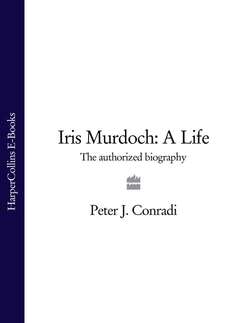Читать книгу Iris Murdoch: A Life: The Authorized Biography - Peter Conradi J. - Страница 39
3
ОглавлениеTo find out who someone is, Napoleon remarked, one must ask, ‘How did the world look, around the time that they were twenty?’ The twelve months before the outbreak of the Second World War were a time of intense hope and fear, anxiety and dread. The young were intensely stirred up. Intensity is the key-word in politics, in friendship and in love alike; a dramatic intensity that radically divided the lives of those who went up to Oxford a year before the war – like Iris, to ‘serious-minded’25 Somerville College in 1938 – from those who, like John Bayley, went up in the disenchanted post-war years. In 1938–39 a Manichean fight against the powers of darkness was imminent, the drumbeat of war unmistakable. There was constant talk of Nazism, the Moscow treason trials, marching and raising money for arms for Spain, the bestial pogrom against German Jews in November 1938, Hitler’s annexation of the Sudetenland. At the same time student life for the first year after Iris came up in late September 1938 was still agreeably wild, irresponsible, aesthetic and cranky. There was still a sense of scope and completeness.26 Charismatic figures abounded, among the students as among the dons. The sober diminishment of university life came later, with war and mobilisation.
The dominant international issue was the Spanish Civil War, which ended only in April 1939. No other cause ever stirred comparable passions in Oxford. The death in Spain of the poet John Cornford, whose brother Christopher was to play a significant role in Iris’s life in the 1960s, had made him ‘a martyr of mythic power’. The war in Spain was so real ‘that it hurt’.27 Iris denied having penned early in 193928 a bad poem about Barcelona, signed ‘I?’, which appeared in the progressive university magazine Oxford Forward. Entitled ‘Vanguard’, it began: ‘Remember – they have ringed/Us England, roundabout with steel/Spain-tempered’, and ends: ‘Yes, gutters running red/In broken Barcelona bear/Witness to a debt. Look,/England, who fights for you.’
A lot of the English aristocracy, together with powerful financiers, were members of the sinister pro-Hitler ‘Anglo-German Fellowship’. Might Britain even enter the war on the wrong side?29 In October 1938 the sitting Conservative Member of Parliament for Oxford had died. Student pressure helped force Patrick Gordon-Walker, the Labour candidate, out of the running, so that tall, shambling Sandy Lindsay, Master of Balliol – the first confessed Socialist to head a college – could fight as the Popular Front candidate against the Conservatives’ Quintin Hogg, the ‘flamboyant and ill-mannered supporter of Chamberlain’,30 without a rival from the left. Lindsay’s support stretched from the Communists through the Labour and Liberal parties, to dissident Conservatives. The international context, immediately after Neville Chamberlain’s agreement with Hitler, made this ‘Munich’ by-election a fight of mythic proportions. ‘Save Peace, Save Czechoslovakia’ was one Lindsay slogan; ‘A vote for Hogg is a vote for Hitler’ another: the by-election was both a referendum on the Munich agreement and a vote of confidence in Chamberlain, who had proposed on 18 September to allow Hitler’s annexation of the Sudetenland.
The substitution of Lindsay for Gordon-Walker affronted sections of middle-class Oxford. Iris canvassed, together with Raymond Carr, a clever, ambitious scholarship boy, down the left-hand side of the Woodstock Road, both of them ill-at-ease and both sympathetic to, and soon members of, the Communist Party. Iris was later to claim, ‘The very first thing I did when I arrived at Oxford was to join the CP':31 this went well with the ideals of Badminton.32 They also worked stuffing envelopes in the Lindsay campaign room opposite St Peter’s College. Carr was in awe of Iris because she was intellectually very impressive, did not care about her dishevelled appearance, and seemed to him to have been at Oxford a full year before him. In fact this was her first month there.33 He was not the first or the last to be struck by Iris’s extraordinary confidence. She also worked in this by-election with fellow-Somervillian Anne Cloake,34 with whom Carr thought her in love. Certainly Anne Cloake, who had no lesbian proclivity, but did like to shock, later boasted of having helped teach Iris the ‘facts of life'; in their second year they shared digs at 43 Park Town.
Hogg won by a small majority. In St Aldates the defeated Lindsay supporters with their tattered red-and-yellow rosettes confronted the Conservatives ‘in their horsey check-coats, with their carnations and rolled umbrellas’ who, they felt, rushed to sneer and crow at them ‘as if after a day’s beagling, or a night in London': ‘What depressed us was that obscurantism had triumphed.’ On the Lindsay side were ‘the creative, the generous, the imaginative. In the other we saw only selfishness, stodginess and insincerity.’ ‘I hope North Oxford gets the first bombs, but it would be rough on the pekinese,’ commented one supporter.35
